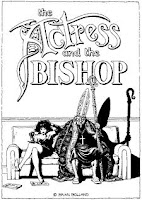 I have, for some time, been collecting useful answers - answers that can be used to respond to all manner of awkward, intrusive or just plain difficult questions.
I have, for some time, been collecting useful answers - answers that can be used to respond to all manner of awkward, intrusive or just plain difficult questions.So I'm going to share with you the best I have found... so far:
"That would be an ecumenical matter"
This comes from the wonderful, witty Father Ted comedy series. Ted attempts to present the appalling Father Jack as a still-functioning member of the clergy by training him to make this reply to any questions posed by a group of visiting bishops. I've tried it and it works - and not just with bishops! You might want to change 'ecumenical' for a similar but more contextual word like 'administrative' or 'ethical' The only problem is that the original is so well known amongst Ted fans, it has a subtext which says: 'I have no idea (a) what your question means, (b) what the answer is, or (c) what my opinions are on this matter.'
Works best with: technical or work-related . e.g. 'What is this company's policy on work/life balance?'
Doesn't work well with: direct questions. e.g. 'What time does it start?'
"I hear what you're saying but..." OR "I'm glad you asked me that..."
The classic riposte of the politician or hobby-arguer. It acknowledges the question, but puts it neatly to one side leaving you to launch on your own trajectory.
Works best: when, actually, you didn't hear what they were saying.
Doesn't work well with: direct questions. e.g. 'What time does it start?'
This is the haiku of useful answers: short, neat, ambiguous. It acknowledges both the question and a panoply of possible answers, all of which you are obviously fully conversant with but which you consider rather old hat.
Works best with: leading questions. e.g. 'Don't you think this is the biggest load of nonsense?'
Doesn't work well with: direct questions. e.g. 'What did you have for lunch?'
"It depends what you mean by ....[insert a word from their question]"
Ah, the classic 'answer a question with a question' gambit. Pick up the questioner on a word or phrase in their question and twist the discussion into a neat exploration of semantics, deflecting attention from the original question. I've even got away with: 'What do you mean by 'mean'?'
Works best: with almost any question. e.g. 'What did you have for lunch?' 'It depends what you mean by 'have'.'
Doesn't work well with: people who are easily provoked to physical violence.
*DRUM ROLL*
... a new addition to the 'Useful Answers' Hall of Fame:
"Don't change the subject!"
This was in a comment on my earlier My dog has no nose post from Dave and I think it's a new classic. It's a little time machine packed into four words - you can use it to return to any point in the discussion (a point where you were on less shaky ground) and steer it on a new course from there.
Works best: almost any question, except...
Doesn't work well: when the conversation only begins with the question in question.
So... any more I should add to my list? ...And, more importantly - any questions?

















